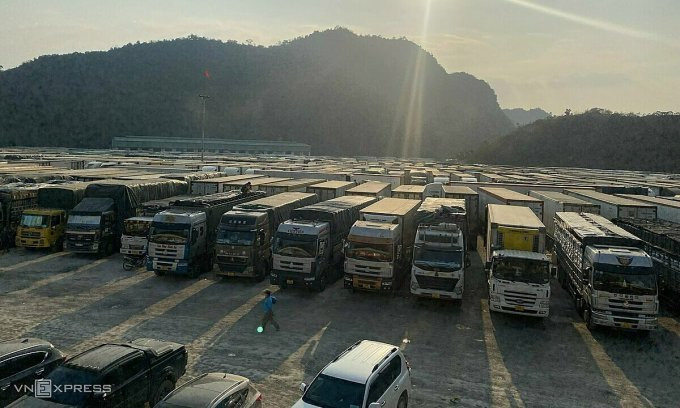Mr. Vu Thanh Tu Anh: VAT should be reduced across the board instead of interest rate support.
Sharing with reporters, Dr. Vu Thanh Tu Anh, Director of the Fulbright School of Public Policy and Management, said that this support package is necessary but should prioritize allocation for fighting the epidemic and maintaining the continuous openness of the economy.
 |
| Dr. Vu Thanh Tu Anh, Director of Fulbright School of Public Policy and Management. Photo: Fulbright University Website |
- What do you think about the proposed 340,000 billion VND fiscal and monetary policy support package this time?
- Havingsupport packageI think it is important but a bit unfortunate in terms of timing, when many countries – including the US and EU – are starting to reduce the size of their economic stimulus packages.
In terms of scale, the value is 340,000 billion but in reality, the amount of money pumped out will be much smaller. The reason is that on the one hand, we have to subtract the financial obligations that businesses will have to repay to the State after the period of deferment, extension, and keeping the debt group intact.
Besides, if the disbursement speed is slow,low disbursement ratewill reduce the effectiveness of the support package as our packages have been implemented in the past 2 years. The most difficult time for people and businesses when the whole country had to isolate for a long time and on a large scale has passed, so now, I think we should not put all our hopes on this 340,000 billion VND package.
In short, in my opinion, the most important support solution at this time is the ability to open and maintain economic activities continuously and sustainably. Of course, I emphasize again, having a rescue package is still necessary instead of letting businesses and people swim on their own.
- So what tasks should this 340,000 billion VND support package be "pumped" into to achieve the goal of maintaining the continuous openness of the economy as you said?
- The success of the support package depends on the priority, speed and effectiveness of implementation, so it is necessary to focus on some areas or subjects of higher importance. For example, investment in health care and epidemic prevention is expected to be 60,000 billion. In my opinion, this task is very important, so depending on the epidemic situation, if necessary, this budget must even increase. Because if the epidemic is controlled, the economy will open in a stable and sustainable manner, which, as I said, is even more necessary than the support package.
 |
| Covid-19 testing in Hanoi. Photo: Giang Huy |
The VND113,800 billion for infrastructure investment is also necessary to help strengthen the competitive and efficient foundation for the economy. Infrastructure investment becomes more urgent in the context of FDI capital flows facing many risks, private sector investment declining, and low state sector investment last year. This is a measure to increase aggregate demand, while creating higher competitiveness in the medium and long term.
On the other hand, I think that education should be given more priority, especially for students from families with limited or no access to high-quality devices and internet for online learning. This is also to avoid creating serious inequality in educational opportunities, affecting future career opportunities and human capital. Imagine how great the loss would be if a student did not receive quality education for two consecutive years, especially in the classes and levels that help shape thinking ability and knowledge base.
- But if only340,000 billion VNDbut againneedincreasePrioritize health care and education. Where can we cut back to focus resources?
- I think the interest rate support package, currently around 40,000 billion VND, can be reduced because it may still conflict with Vietnam's monetary policy, interest rate policy and inflation control target this year.
The biggest problem for businesses today is not a lack of credit. The banking system is not lacking liquidity, and interest rates are lower than the same period last year.Inflationary2021 is also relatively low. When making a policy, you have to see what problem of the economy it solves. At present, I do not see the lack of credit, or high cost of credit as an important problem that needs to be solved by interest rate support.
 |
| Trucks carrying Vietnamese agricultural products were congested at Lang Son border gate in December 2021 due to China's tightening of quarantine. Photo: Lang Son Customs |
The economy is currently lacking business opportunities, supply chains are broken, production is stagnant. When adding liquidity and supporting 2 percentage points of interest rates, these urgent problems are not resolved. Not only that, this can give rise to some macro consequences, especially when the timing of the bailout package coincides with the cycle of price index increase. Currently, inflation in the world is increasing very rapidly, and it will be imported into Vietnam in the form of raw material costs and energy prices. At that time, combined with the domestic economic recovery, it will create demand pull and cost push, causing Vietnam's inflation to increase. This is also a risk when Vietnam's support package is out of sync with the world in terms of timing as I mentioned above.
- Some National Assembly members believe that the bailout package is not to rescue weak businesses but to restore the whole economy, that is, to prioritize healthy businesses. What is your opinion?
- If the goal now is to restore the economy, recreate jobs, and support social security, it is impossible to target a few large enterprises. A few large enterprises will not be able to ensure jobs for millions of people who have lost their jobs or suffered from labor shortages in the recent period.
My view is that the State must create an environment in which there is equal access to support for businesses of different sizes in the same sector. For example, in the tourism industry, not only the big guys should be saved but all tourism businesses should have the same access to policies. Of course, there are sectors that need more support than others, such as trade and services, which have been most severely affected in recent times.
- But giving priority to target businesses creates momentum for other businesses to recover?
- In theory, when the support budget is limited, the target must be as precise as possible. However, the reality of many countries in recent times shows that targeting policies are correct in theory, but not easy to implement and therefore often do not achieve the expected results. The reason is that in order to implement the "target" policy, the implementing agencies must distinguish which businesses are eligible for support and which are not, while in reality, they can operate in many industries and fields.
Not to mention, to identify priority businesses, the management agency must classify and to avoid the risk of wrong support and then take responsibility later, they will emphasize administrative procedures and processes. This significantly reduces the speed and accessibility of businesses. This is a trade-off between one side being fast but can lead to mistakes, and the other side being very detailed criteria, very good in theory, but slow in implementation and low disbursement rate. Our policy is already slow, if it continues like this for another 6 months, 1 year, when looking back, we will see that the effectiveness of using and allocating support packages is very limited. I think in the case of "relief" requiring fast speed and wide access, we have to accept a second best policy instead of a perfect policy (first best).
- If we don't spend money on reducing interest rates, and don't prioritize a few "exact addresses", then what solution do you think will be quick and have a wide-ranging impact?
- I think that reducing value added tax (VAT) across the board is the fastest and most effective at this time. Currently, the draft has proposed reducing VAT from 10% to 8% for groups of goods and services, except for some groups in industries with development advantages such as telecommunications, finance, banking, insurance, real estate business... But I think doing it across the board would be better. This will simplify the process for both businesses and management agencies, because in reality, businesses can operate in multiple industries and fields. With VAT, there is no need to create new apparatus or new procedures. The enforcement agency only needs to base on the correct records as usual to reduce taxes for businesses.
Reducing corporate income tax is also often mentioned. But the downside is that for businesses in difficulty, they do not incur tax obligations and therefore will not benefit. This tax only supports businesses that are doing well. As for VAT, whether they are doing well or not, they will benefit.
Besides, an important feature of VAT is that the tax burden is shared between businesses and consumers, so when VAT is reduced, both parties benefit.
In short, if possible, I think that interest rate subsidies should be transferred to other targets such as healthcare, education, or VAT reduction across the board to create better economic efficiency.
- In addition to supporting the economy, the 340,000 billion VND package also brings some consequences in terms of inflation and bad debt risks. In your opinion, how can we reduce these risks?
- Vietnam will certainly face higher inflation in 2022. This is inevitable. We cannot avoid rising inflation when we have to import inflation from outside while the domestic economy is on the path to recovery.
Last year, economic growth was weak, inflationary pressure was low even though money was still being pumped out. This year, as the economy gradually recovers, consumer demand and public procurement investment will increase, pushing up aggregate demand. Meanwhile, aggregate supply has not recovered correspondingly, which will push up prices.
Bad debt may increase dramatically this year. The reason is that we previously allowed the debt group to remain the same by technical measures, so when the debt returned to its true nature, many debts that were not bad on the books now became bad debt in reality.
Therefore, to reduce the risk of bad debt and not put too much pressure on inflation,First, we should not pump money through interest rate support. Next, we should ensure control of bad debt in the banking system. The State Bank has gained a lot of experience in this matter after the 2013-2014 period. Finally, we should reduce the burden on monetary policy and increase the weight of fiscal policy.
What we are doing in monetary policy is on the right track. I believe that once the State Bank maintains low interest rates, maintains the safety of the financial and monetary system, ensures liquidity, and controls bad debt to avoid a collapse like the past two years, it has completed its mission. Then we should let the market operate according to its inherent laws.
In fact, we cannot avoid an increase in inflation in 2022, so we need to find ways to reduce bad debt and not put more pressure on monetary policy. Because the burden of monetary policy this year is certainly much greater than last year.
Thank you!

